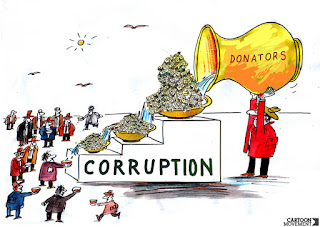One of the main reasons for supporting independence is the lack of any prospect of meaningful reform within the UK. Regardless of which side gets in, there are certain aspects of Westminster governance that simply will not change. As this blog could conceivably become the longest on this site we’re going to split it into three bite sized parts: donations, outside interests and honours.
"I can't see anything wrong with the current system," every Westminster MP (probably)
Donations
All political parties in the UK rely on private donations to
fund their operations. Many people
believe that changing this will result in the public paying for negative
political campaigns and mud slinging however we can see that the current system
isn’t working. Let’s look at where Westminster’s
money is coming from. These numbers are from 2011 and look at funding going to
the Conservative Party – the party of power at Westminster (source - http://www.thebureauinvestigates.com/2011/09/30/the-biggest-conservative-donors-from-beyond-the-square-mile/):
£1,384,070 from Hedge Funds
£1,305,806 from Financiers
£1,158,000 from Fund and Asset Managers
£0,607,771 from Banking
£0,565,400 from Private Equity
£0,473,253 from Trading, Broking and Dealing
£0,193,157 from Financial Services
£0,189,400 from Insurance
This means that more than £5,876,000 was paid to the ruling
party at Westminster from individuals and groups from the City of London. Should we be surprised to see that those
working in these industries are enjoying vast increases to their wealth whilst
everyone else struggles?
"It's called 'London style trickle down economics'...our loose change makes the system work!" every Westminster donor (probably)
But there is big money to be found from those outside the
city. Donors linked to ATOS, the company
which administers £3 billion worth of government contracts to carry out Work
Capability Assessments, have given £1.3 million in donations to the Conservatives. We’re sure this is just a co-incidence,
however the perception that policies and contracts can be bought through
donations is one of the reasons why so many people are put off politics. This is the sort of thing that won’t change
in the UK but could change with independence.
And our funding questions aren’t restricted to the
Conservative Party. We saw in June this
year the details of a businessman being advised by the Labour Party on how to dramatically
reduce tax payments by changing the way he made his donation. And there are other aspects to how and when donations are made that deserve scrutiny. And for those of you are new to this subject,
here’s a reminder of when Labour were in power...
Gordon Brown in row over donations scandal
Tony Blair's legacy of sleaze cannot be cleaned up
Labour peers: Gordon Brown to get to bottom of Lords corruption allegations
Tony Blair's legacy of sleaze cannot be cleaned up
Labour peers: Gordon Brown to get to bottom of Lords corruption allegations
Many will argue that the examples we see above are not
illegal. We agree, and that is precisely
the point. These things will never be
made illegal at Westminster unless a more convenient method of paying money to
political parties is found. And there’s
a wider issue: are we expected to believe that these incredibly wealthy
individuals and multi-national corporations are making these donations for purely
altruistic reasons?
Mike Slade, Chief Executive of Helical Bar and significant
donor to the Conservative Party, made this quote. “You do run the thin line of someone saying:
I’m only doing this to have access and influence, but that was what politics
was always about. It is a little unfair
but there must be 20% truth in it”.
Is that the type of democracy we can have faith in? According to the Bureau of Investigative
Journalists, the Conservative Party had a scheme in place which allowed those
who donated £50,000 or more a year a face to face meeting with David Cameron. Once again this isn’t illegal, but it can’t
be in line with the spirit of democracy. (source - http://www.thebureauinvestigates.com/2011/09/30/analysis-can-money-buy-political-influence/)
"I, uh, approve of this system," Mayor Joe Quimby
Westminster is in the minority when it comes to party
funding. In Germany, 50% of political funding
comes from the state, limiting how much influence any individual can have over
policy whilst allowing smaller parties a chance to compete. Canada allows no donations from businesses or
trade unions, meaning that parties are funded by their members, a system which
appears to work quite well.
In Scotland, we have the chance to put in place a fairer,
more transparent system of party financing.
We can enshrine, in a written constitution, the principles by which we
expect our elected officials to operate within, and ensure that the biggest
policy shapers and influencers are the voters of Scotland. If this is what you believe, then you have to
vote ‘Yes’ in 2014
And if you’re still not convinced yet, then stay tuned for Part 2!
Drew
If you like this blog, then please consider visiting our other sites:
Facebook - Sign for Scotland
YouTube - Sign4Scotland
Twitter - Sign4Scotland
Facebook - Sign for Scotland
YouTube - Sign4Scotland
Twitter - Sign4Scotland




No comments:
Post a Comment